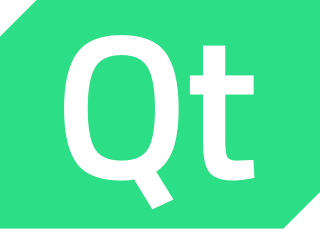
Qt is free and open-source cross-platform software for creating graphical user interfaces as well as cross-platform applications that run on various software and hardware platforms such as Linux, Windows, macOS, Android or embedded systems with little or no change in the underlying codebase while still being a native application with native capabilities and speed.
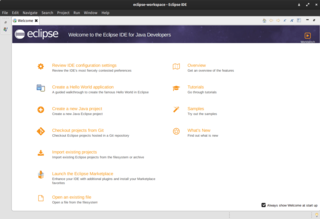
Eclipse is an integrated development environment (IDE) used in computer programming. It contains a base workspace and an extensible plug-in system for customizing the environment. It is the second-most-popular IDE for Java development, and, until 2016, was the most popular. Eclipse is written mostly in Java and its primary use is for developing Java applications, but it may also be used to develop applications in other programming languages via plug-ins, including Ada, ABAP, C, C++, C#, Clojure, COBOL, D, Erlang, Fortran, Groovy, Haskell, JavaScript, Julia, Lasso, Lua, NATURAL, Perl, PHP, Prolog, Python, R, Ruby, Rust, Scala, and Scheme. It can also be used to develop documents with LaTeX and packages for the software Mathematica. Development environments include the Eclipse Java development tools (JDT) for Java and Scala, Eclipse CDT for C/C++, and Eclipse PDT for PHP, among others.

IntelliJ IDEA is an integrated development environment (IDE) written in Java for developing computer software written in Java, Kotlin, Groovy, and other JVM-based languages. It is developed by JetBrains and is available as an Apache 2 Licensed community edition, and in a proprietary commercial edition. Both can be used for commercial development.
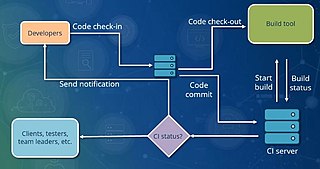
In software engineering, continuous integration (CI) is the practice of merging all developers' working copies to a shared mainline several times a day. Nowadays it is typically implemented in such a way that it triggers an automated build with testing. Grady Booch first proposed the term CI in his 1991 method, although he did not advocate integrating several times a day. Extreme programming (XP) adopted the concept of CI and did advocate integrating more than once per day – perhaps as many as tens of times per day.
CVSNT is a version control system compatible with and originally based on Concurrent Versions System (CVS), but whereas that was popular in the open-source world, CVSNT included features designed for developers working on commercial software including support for Windows, Active Directory authentication, reserved branches/locking, per-file access control lists and Unicode filenames. Also included in CVSNT were various RCS tools updated to work with more recent compilers and compatible with CVSNT.
Microsoft Visual SourceSafe (VSS) is a discontinued source control program oriented towards small software development projects. Like most source control systems, SourceSafe creates a virtual library of computer files. While most commonly used for source code, SourceSafe can handle any type of file in its database, but older versions were shown to be unstable when used to store large amounts of non-textual data, such as images and compiled executables.

FreeBSD is a free and open-source Unix-like operating system descended from the Berkeley Software Distribution (BSD). The first version of FreeBSD was released in 1993. In 2005, FreeBSD was the most popular open-source BSD operating system, accounting for more than three-quarters of all installed and permissively licensed BSD systems.
OpenJDK is a free and open-source implementation of the Java Platform, Standard Edition. It is the result of an effort Sun Microsystems began in 2006. The implementation is licensed under the GPL-2.0-only with a linking exception. Were it not for the GPL linking exception, components that linked to the Java Class Library would be subject to the terms of the GPL license. OpenJDK is the official reference implementation of Java SE since version 7.

Ext JS is a JavaScript application framework for building interactive cross-platform web applications using techniques such as Ajax, DHTML and DOM scripting. It can be used as a simple component framework but also as a full framework for building single-page applications (SPAs).
SVNKit is an open-source, pure Java software library for working with the Subversion version control system. It is free to use on opensource projects but requires that you buy a commercial license to use to develop with proprietary software. It implements virtually all Subversion features and provides API to work with Subversion working copies, access and manipulate Subversion repositories.
This is a compendium of continuous integration software that supports a software engineering practice, continuous integration, in which developers' changes are immediately tested and reported when they are added to the mainline code base. The comparison of various continuous integration tools is done on the basis of platform, license, builders and Integration IDEs.
YouTrack is a proprietary, commercial browser-based bug tracker, issue tracking system and project management software developed by JetBrains. It focuses on query-based issue search with auto-completion, manipulating issues in batches, customizing the set of issue attributes, and creating custom workflows.
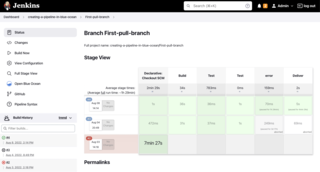
Jenkins is an open source automation server. It helps automate the parts of software development related to building, testing, and deploying, facilitating continuous integration and continuous delivery. It is a server-based system that runs in servlet containers such as Apache Tomcat. It supports version control tools, including AccuRev, CVS, Subversion, Git, Mercurial, Perforce, ClearCase and RTC, and can execute Apache Ant, Apache Maven and sbt based projects as well as arbitrary shell scripts and Windows batch commands.

Xamarin is a Microsoft-owned San Francisco-based software company founded in May 2011 by the engineers that created Mono, Xamarin.Android and Xamarin.iOS, which are cross-platform implementations of the Common Language Infrastructure (CLI) and Common Language Specifications.
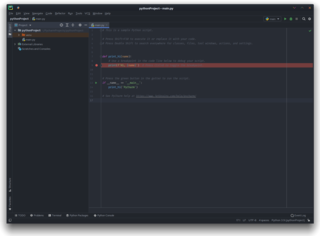
PyCharm is an integrated development environment (IDE) used for programming in Python. It provides code analysis, a graphical debugger, an integrated unit tester, integration with version control systems, and supports web development with Django. PyCharm is developed by the Czech company JetBrains.
Travis CI is a hosted continuous integration service used to build and test software projects hosted on GitHub, Bitbucket, GitLab, Perforce, Apache Subversion and Assembla.
Java code coverage tools are of two types: first, tools that add statements to the Java source code and require its recompilation. Second, tools that instrument the bytecode, either before or during execution. The goal is to find out which parts of the code are tested by registering the lines of code executed when running a test.
JetBrains s.r.o. is a Czech software development private limited company which makes tools for software developers and project managers. The company has its headquarters in Prague, and has offices in China, Europe, and the United States.
GoCD is an open-source tool which is used in software development to help teams and organizations automate the continuous delivery (CD) of software. It supports automating the entire build-test-release process from code check-in to deployment. It helps to keep producing valuable software in short cycles and ensure that the software can be reliably released at any time. It supports several version control tools including Git, Mercurial, Subversion, Perforce and TFVC. Other version control software can be supported by installing additional plugins. GoCD is released under the Apache 2 License.








